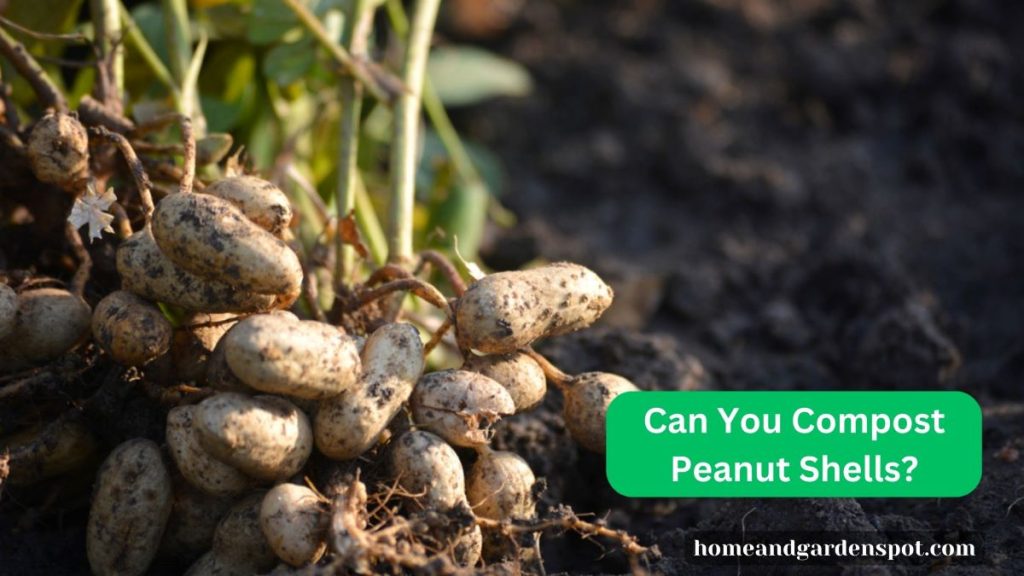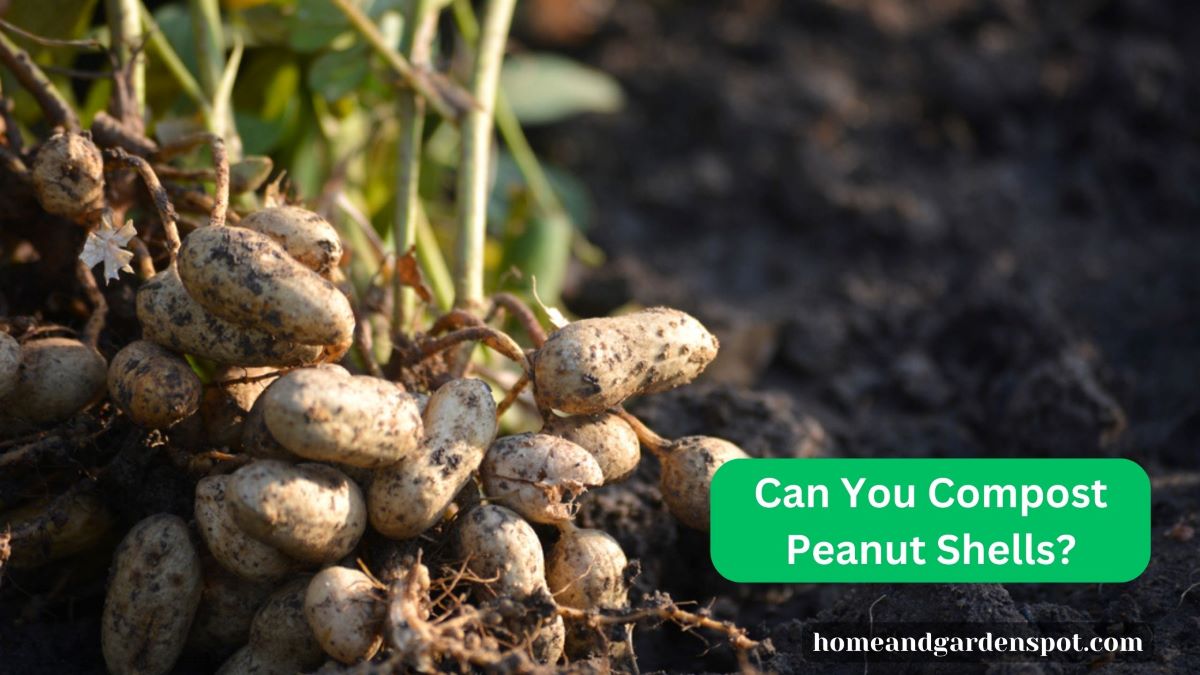Composting is a sustainable practice that has been a cornerstone of my environmentally-conscious lifestyle for many years.
As a gardener and someone deeply committed to reducing waste, I’ve explored various materials and items to include in my compost pile.
One question that often comes up is whether peanut shells can be composted.
In this discussion, I will draw upon both personal experience and expertise in composting to provide a comprehensive answer to this common question.
I’ll delve into the composition of peanut shells, their potential benefits and drawbacks in compost, and the best practices for incorporating them into your composting routine.

Is Peanut Shell Good For Compost?
Yes, peanut shells are good for compost. For several reasons, peanut shells can be a valuable addition to your compost pile.
They are rich in carbon, an essential component for achieving a balanced carbon-to-nitrogen ratio in compost, promoting successful decomposition and nutrient-rich compost creation.
Peanut shells also enhance aeration and structure in the compost, preventing compaction and encouraging beneficial microorganisms’ activity.
While they decompose slowly, this quality ensures a longer-lasting compost pile and gradual nutrient release.
Also, peanut shells contain small amounts of essential potassium and calcium, enriching the compost’s nutrient content over time.
To make the most of peanut shells in composting, it’s advisable to chop or crush them, maintain a proper balance with other compostable materials, and avoid shells from salted or flavored snacks that might contain harmful additives.
In sum, with proper handling, peanut shells can play a valuable role in creating nutrient-rich compost for your garden.
How Long Does It Take Peanut Shells to Decompose?
The decomposition time of peanut shells depends on various factors, such as the size of the shells, the temperature, the moisture, the soil quality, and the weather.
However, some sources estimate that a whole shell takes eight to 24 months to decompose when left outdoors.
If the shells are crushed, rinsed, soaked, and mixed with other compost materials, they may decompose faster and enrich the soil with carbon and micronutrients.
Are Peanut Shells Good For The Soil?
Peanut shells benefit the soil if properly composted and mixed with other organic materials. Here are some reasons:
1. They Are Rich In Carbon
Peanut shells are rich in carbon, which is essential for plant growth and soil health.
Carbon helps form organic matter in the soil, which improves the soil structure, water retention, and nutrient availability.
Carbon also feeds the beneficial microorganisms in the soil, which help decompose organic matter and recycle nutrients.
Peanut shells have a high carbon-to-nitrogen ratio of about 35:1, which means they can provide a lot of carbon to the soil.
2. It Contains Micronutrients
Peanut shells contain calcium, magnesium, iron, and zinc micronutrients. These are important for plant growth and development, as they are involved in various physiological and biochemical processes, such as photosynthesis, enzyme activation, and hormone synthesis.
Micronutrients help plants resist diseases and pests and enhance their quality and yield. Peanut shells can supply these micronutrients to the soil and increase its fertility.
How to Compost Peanut Shells
Composting peanut shells is a great way to recycle organic waste and enrich your soil with nutrients.
However, there are some precautions you need to take to ensure a successful and safe composting process. Here are the steps you can follow to compost peanut shells:
Step 1: Collect And Prepare Your Peanut Shells
You should only use clean peanut shells that are free of any fungal diseases, salt, or flavorings.
You can rinse them with water to remove any dirt or residue. You should also crush them into smaller pieces to help them decompose faster. You can use a blender, a hammer, or your hands to do this.
Step 2: Add Your Peanut Shells To Your Compost Pile Or Bin
You should mix them with other green materials high in nitrogen, such as grass clippings, vegetable scraps, coffee grounds, or manure.
This will balance the carbon-to-nitrogen ratio of your compost and speed up the decomposition process.
A good rule of thumb is to use one part green materials to two parts brown materials (such as peanut shells, leaves, straw, or paper).
Step 3: Turn and moisten your compost regularly
You should turn your compost pile or bin every few days to aerate it and distribute the moisture evenly.
This will prevent anaerobic conditions that can cause bad odors and slow decomposition.
You should also check the moisture level of your compost and add water if it is too dry or dry materials if it is too wet. Your compost should be moist but not soggy, like a wrung-out sponge.
Step 4: Harvest And Use Your Compost
Your compost is ready when it is dark, crumbly, and smells earthy. This can take anywhere from two months to a year, depending on the size and condition of your compost pile or bin.
You can sift your compost through a screen or a mesh to remove large or undecomposed materials. You can then use your compost as a fertilizer or a soil amendment for your plants.
You can also use it as a mulch around your plants, but be careful not to spread it too thickly or too close to the stems, which can cause fungal diseases or pests.
The Ideal Conditions For Successful Composting Peanut Shells
1. Temperature
The compost pile should maintain temperatures between 110°F and 160°F for optimal decomposition.
This temperature range is ideal for killing weed seeds, pathogens, and pests that may be present in peanut shells or other materials.
To maintain this temperature, the compost pile should be turned regularly to allow air circulation and heat distribution.
The pile should also be moist but not soggy, as too much water can lower the temperature and slow the decomposition process.
2. Moisture
The compost pile should have a 40% and 60% moisture content. This means that the pile should feel like a wrung-out sponge when squeezed.
Too much moisture can create anaerobic conditions that produce foul odors and inhibit decomposition.
Too little moisture can dry out the pile and slow down the microbial activity. Water can be added or removed as needed to adjust the moisture level.
3. Aeration
The compost pile should have adequate oxygen supply for aerobic decomposition to occur.
This means the pile should be loose and fluffy, not compacted or dense. Aeration can be achieved by turning the pile with a fork or shovel every few days or using a compost tumbler or bin with vents or holes for air circulation.
Aeration helps maintain the pile’s temperature, moisture, and pH balance, as well as prevent odors and pests.
Tips On Composting Peanut Shells
Composting peanut shells is a way to recycle organic waste and enrich your soil with nutrients.
However, there are some tips you should follow to ensure a successful and safe composting process. Here are some of the tips on composting peanut shells:
1. Use Clean Peanut Shell
Peanut shells can harbor pathogens such as Southern Blight and Aspergillus flavus, which can cause rot, wilt, and aflatoxin contamination in crops.
To avoid this risk, you should only compost peanut shells that are clean and disease-free and avoid using them as mulch around vulnerable plants.
2. Always Cut Into Smaller Pieces
Crush the peanut shells into smaller pieces to help them decompose faster. You can use a blender, a hammer, or your hands to do this.
Smaller pieces will increase the surface area for the microbes and worms to break down the shells.
3. Always Soak Them
Soak the peanut shells in water for 12 to 16 hours before adding them to your compost pile or bin.
This will help them to hydrate and soften up, and the soil bacteria and worms will break them down faster.
If the shells are from salted peanuts, you should soak them and change the water at least once to eliminate the extra salt. Salt can harm your plants and change the pH level of your soil.
Cons Of Composting Peanut Shells
1. They May Carry Fungal Diseases That Can Infect Your Plants
Peanut shells can harbor pathogens such as Southern Blight and Aspergillus flavus, which can cause rot, wilt, and aflatoxin contamination in crops.
To avoid this risk, you should only compost peanut shells that are clean and disease-free and avoid using them as mulch around vulnerable plants.
2. They Are Slow To Decompose
Peanut shells are high in carbon and low in nitrogen, which means they take a long time to break down in the compost pile.
To speed up the process, you should crush them into smaller pieces, soak them in water, and mix them with other green materials rich in nitrogen, such as grass clippings or vegetable scraps.
You should also turn the pile regularly to aerate it and distribute the moisture evenly.
3. They May Attract Pests And Rodents
Peanut shells can be a tempting food source for squirrels, rats, mice, raccoons, and birds, which may dig into your compost pile and scatter the contents.
To prevent this problem, you should cover your compost pile with a layer of soil or a tight-fitting lid and place it away from fences or trees that can provide access to critters.
You should also avoid adding salted or flavored peanut shells to your compost, as they may contain harmful chemicals or additives that affect your compost quality.
Conclusion
You can compost peanut shells. Peanut shells are a source of carbon-rich material, making them suitable for composting.
When added to your compost pile, they will break down over time and contribute to the creation of nutrient-rich compost.
Peanut shells can be a valuable addition to your compost pile, helping you reduce waste and create nutrient-dense soil for your garden.
Just remember to balance them with nitrogen-rich materials and maintain proper composting conditions for the best results.

Leave a Reply